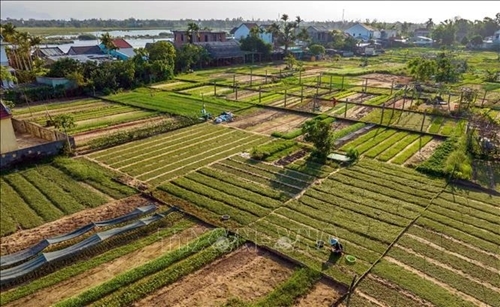The UNWTO's evaluation criteria encompasses a range of factors, including cultural and natural resources, promotion and preservation of cultural assets, socio-economic and environmental sustainability, tourism development and value chain integration, governance, infrastructure and connectivity.
    |
 |
|
Tra Que vegetable village |
Founded in the 16th century, Tra Que is a mere 3km from the historic Hoi An ancient city and 20km from the bustling central city of Da Nang. Bordered by the serene Co Co river and Tra Que lagoon, the village boasts fertile sandy soil and a temperate climate - ideal conditions for organic vegetable farming that has thrived for generations.
The village was once a patchwork of homes and gardens, with uneven fields punctuated by irrigation ponds. However, a visionary tourism-oriented development plan initiated over two decades ago transformed Tra Que. Houses were relocated, ponds were leveled, and the landscape was restructured into neat, square fields traversed by well-designed pathways.
Today, Tra Que spans 18 ha, home to 202 households and 326 farmers who cultivate over 20 types of vegetables. Thousands of visitors flock to the village daily, eager to immerse themselves in the picturesque landscape and engage in hands-on farming experiences.
In April 2022, the Ministry of Culture, Sports and Tourism recognised Tra Que vegetable farming as a national intangible cultural heritage, celebrating its rich traditional knowledge and craftsmanship.
But Tra Que is more than just a farming village, it is a treasure trove of history. The Tho Than shrine, Ngu Hanh temple, and the tomb of Nguyen Van Dien are just a few of the sites that offer a glimpse into the village's rich past. Well-preserved customs like the Cau Bong ritual and unique culinary traditions also further enrich visitors' experiences.
Tra Que's recognition by the UNWTO follows the success of Tan Hoa tourism village in Minh Hoa district, Quang Binh province, which received the same distinction in 2023.
Source: VNA